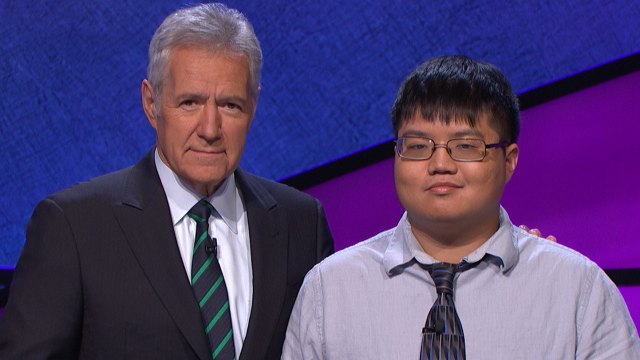Arthur Chu returns to television today, the Jeopardy champion with the unconventional playing style who’s either hacking or ruining one of America’s most popular game shows. But Chu’s supposedly unorthodox methods are not all that radical: IBM’s Watson uses those same tactics to beat humans.
Chu’s been able to amass a small fortune by using game theory to study and analyse Jeopardy.
The strategies that seem to annoy people the most include interrupting Alex Trebek to speed up the game (because money left on the board is not money in Chu’s pocket), bouncing erratically around the board to throw his fellow players off, and diving into the high-dollar-amount questions first to “hunt” for Daily Doubles which are normally found in the bottom two rows.
He also wages small amounts for Daily Doubles if he doesn’t know anything about the category, which is not really radical but just plain smart. I mean, has anyone in the history of Jeopardy ever said “I dunno?”
But, according to former Jeopardy champions, “gaming” Jeopardy is nothing new. Head over to the J! Archive for a peek at some of the strategies that have been suggested and tested by players and fans over the years. Chu’s most obvious technique, skipping around the board, actually has a name: The “Forrest Bounce.” The Bounce was invented by 1985 champion Chuck Forrest, whose law-student roommate suggested it as the only real way to get ahead, assuming everyone playing has the same level of knowledge.
It makes sense. So it would make sense that a computer designed to win Jeopardy uses the same tricks.
Writer and former Jeopardy champion Greg Lindsay tells Gizmodo that the first time he encountered this style of playing was when he played Watson in 2010. “Watson’s tendency to choose the most expensive clues first forced me to adopt similar tactics, and its propensity to build up big leads accordingly forced me to search horizontally for Daily Doubles instead vertically running a category.” Learning from Watson worked: Lindsay beat the supercomputer three times.
However, that strategy can backfire — especially for a human, says Lindsay. “The categories are designed to teach you how to play them, so leaping to the end can leave you at as big a disadvantage as your fellow contestants.” In fact, producers for the game instruct contestants to play each category sequentially for that very reason.
But the producers have another reason for encouraging this style of play: because it’s easier for viewers to follow along at home.
Lindsay’s experience reminds us of something else about Jeopardy in general: It’s still a TV show. “The outcry over Chu’s style of play is interesting, but it underscores that Jeopardy is first and foremost a game show whose popularity stems from people playing along from home,” he says. “It’s very different from the quiz shows of the 1950s, like 20 One, which were mental feats of strengths meant to be admired, not emulated. No one watches the Olympics imagining they could win a gold in downhill skiing, but a lot of people imagine themselves as Jeopardy champions. Chu’s tendency to whipsaw from category to category gives the audience whiplash and shatters that illusion.”
Chu might not be the first to use these techniques but he’s the first to employ them so brazenly, which is almost a distraction to the game itself. That’s why people are angry. No one seemed to mind when Watson dove randomly into the middle of a category: Whoa, look at that crazy machine and its crazy machine-thinking! Now that Chu is a human thinking like a machine and thus dominating a game others try to play as regular people, is there still a place for the old strategy?
Like other champions, Lindsay is excited to see what happens to Jeopardy post-Chu: “I played the game conventionally at the producers’ urging. But things are about to get a lot more interesting now that someone has some success with it.” Injecting new life into an ageing game show — which has been on the air for 30 years — is another accomplishment completely. This could radically alter the way the game is played with “old” and “new” styles facing off against each other (maybe the “Chu Shuffle?”). The producers should be giving Chu more than just prize money.
